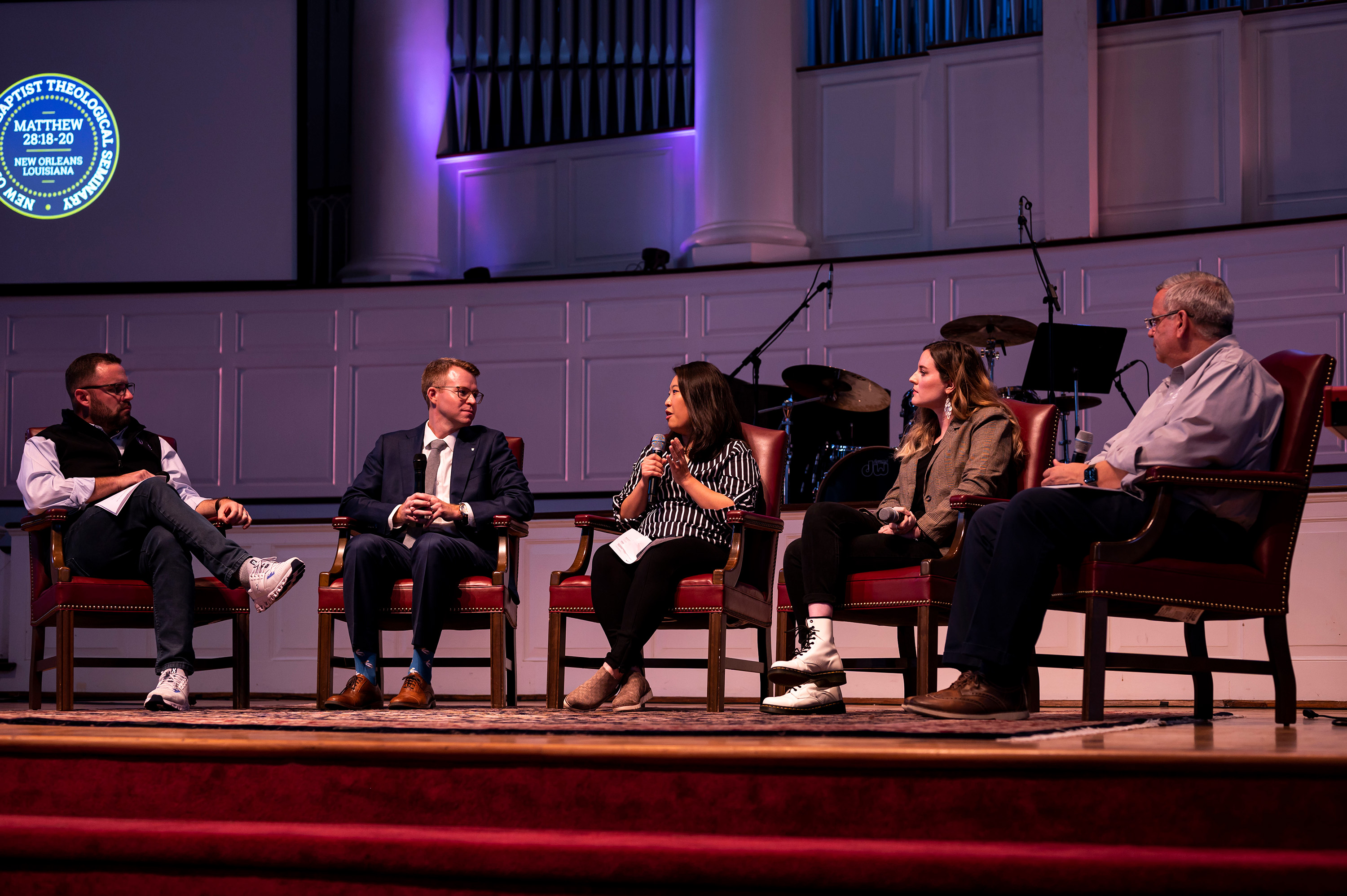
“Let’s roll up our sleeves,” Jamie Dew, New Orleans Baptist Theological Seminary and Leavell College president, said in calling on believers to join the work of crisis pregnancy centers.
Dew’s comment came during a chapel program Oct. 27 highlighting how the church can help women in unexpected pregnancies. Guests included Ben Clapper, Louisiana Right to Life executive director; Hyuna Franklin, director, and Maci Duncan, client care coordinator, Community Center for Life, New Orleans area; and Thomas Strong, a local pastor and NOBTS faculty member whose church supports a pregnancy center. Dew moderated the event.
“One church can make a difference,” Dew said, “but 100 churches can make a huge difference.”
Ben Clapper reported that 7,444 abortions were performed last year in Louisiana but that the number is expected to drop to zero with the overturn of Roe v. Wade and the implementation of Louisiana pro-life laws.
Clapper urged listeners to consider the care women facing unexpected pregnancies will now need.
“That means we have got to fill the gap,” Clapper said. “Love has got to fill the gap … that used to be filled by abortion.”
Thomas Strong, pastor and NOBTS vice president for spiritual formation and student life, said his church was moved to action after learning about and praying for the crisis pregnancy center.
“It was important for us not just to say it was an important issue, but for us to say it was important enough for us to do something about it,” Strong said. “Prayer is important. It starts there, but it doesn’t stop there.”
‘MOBILIZE TOGETHER’
At the Community Center for Life, Gretna, La., pregnancy tests, limited ultrasounds, infant supplies, counseling, community resource and adoption information are available free.
Hyuna Franklin, an NOBTS graduate, said the center depends on churches to help them meet the varied needs of women and their children, up to age four.
“Our goal is to walk alongside mothers and families facing unplanned pregnancies and save the unborn that way by loving them and caring for them,” Franklin said.
Franklin said that volunteers can partner with other faith-based organizations or help in creative ways and told of a mechanic who repaired older cars and donated them to mothers in need.
“No special skill set is needed,” Franklin added.
Maci Duncan, NOBTS alum, said the “number one issue” her clients face is loneliness. Duncan said clients often lack a support system, sometimes to the extent of being unable to identify someone as an emergency contact.
“We want to make abortion unthinkable,” Duncan said. “We as the church can do that. We can be part of the solution if we mobilize together.”
A PASTOR’S IMPACT
Dew pointed out that many NOBTS students feel called to the ministry and asked what pastors can do to engage the church.
“First, compassion,” Clapper responded. “We have to be compassionate but we have to be compelling. Too often churches, because they feel it’s a difficult topic, will choose silence instead of a compassionate way to address it.”
Clapper noted that the seminary “exports pastors all over the nation,” and pointed to the opportunity that presents.
“We have the chance to almost be ‘pro-life evangelists,’” Clapper said. “In the past with Roe v. Wade, we really didn’t have that option because we couldn’t change the law. Now we can.”
A good resource for churches, Clapper said, is Embrace Grace, a resource designed to empower churches to provide support groups for men and women in unplanned pregnancies. Duncan echoed Clapper’s praise saying the Embrace Grace support groups can become the “spiritual community that’s so desperately needed.”
While Roe v. Wade has been overturned, culture and laws change quickly, Clapper warned. Dew acknowledged that the church must remain vigilant.
“The work continues. The education continues. The resourcing continues. The help continues,” Dew said. “We have to continue in this work and it’s not done.”
To find help and resources in Louisiana, visit FindHelpLa.com.